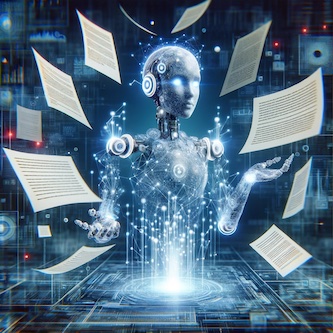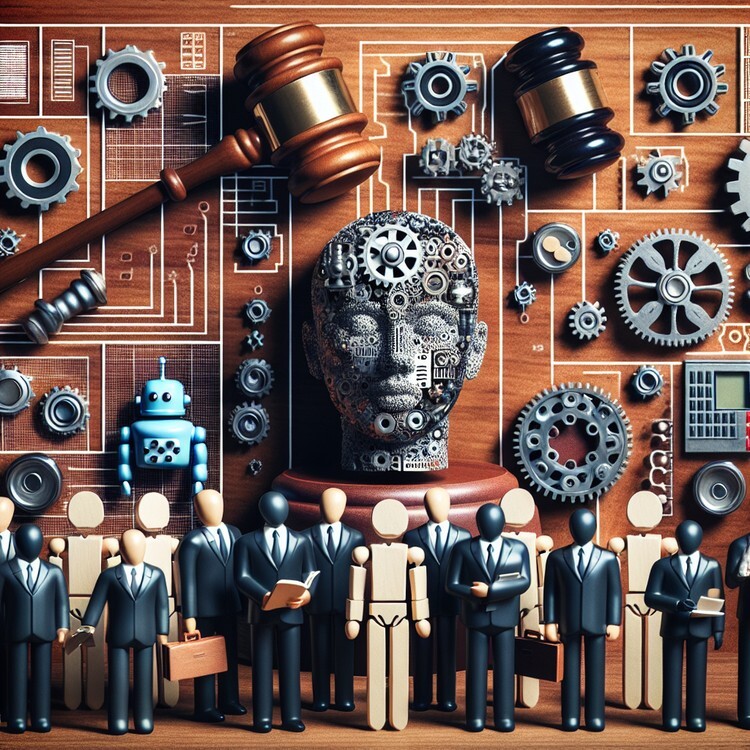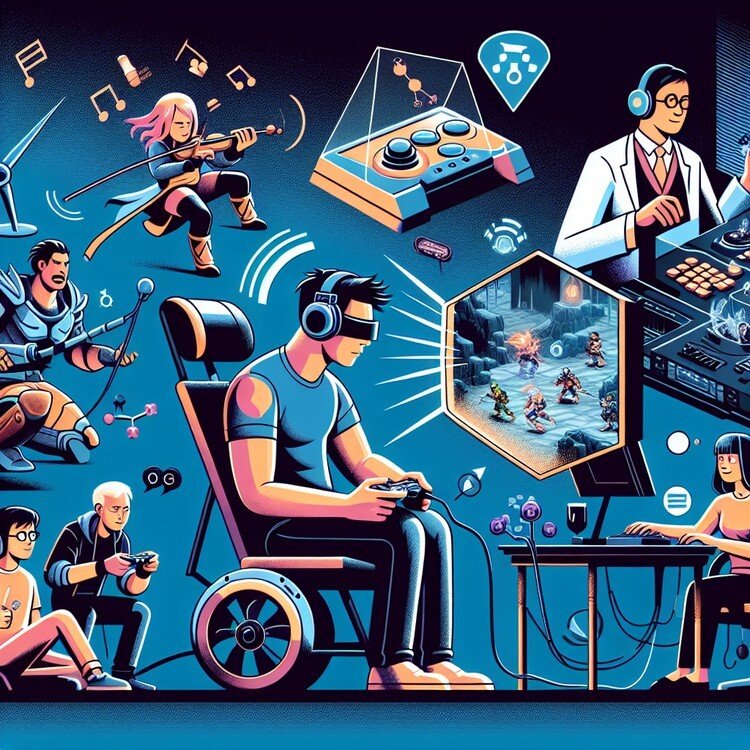AI in Contract Negotiations
Artificial intelligence (AI) is revolutionizing the legal profession, particularly in contract negotiations. Luminance, a UK-based company, is at the forefront of this development, with its upcoming launch of Luminance Autopilot, a fully automated contract negotiation tool. This technology aims to streamline the tedious and time-consuming process of reviewing contracts, allowing legal professionals to focus on strategic aspects of their work.
During a demonstration of the Autopilot, the AI swiftly reviewed and modified a non-disclosure agreement, making changes to clauses such as contract term, governing law, and liability cap. The negotiation process between two AI systems resulted in a mutually agreed contract within minutes, significantly reducing delays caused by human involvement.
Luminance’s Autopilot is an evolution of its copilot tool, which assists legal professionals in reviewing contracts by color-coding and redrafting clauses. The system is built on a large language model (LLM) trained using over 150 million legal documents, enabling it to learn from a company’s signed contracts and tailor its suggestions accordingly.
While AI is transforming the legal landscape, there is consensus that human expertise will remain essential in contract negotiations. Connagh McCormick, a general counsel, emphasizes the importance of human oversight and accountability in the final review and signing of contracts. The Law Society of England and Wales president also acknowledges that AI cannot fully replace the legal expertise provided by qualified professionals.
As technology continues to evolve, the role of lawyers and the skills required in the legal profession are likely to adapt. While AI offers significant benefits in streamlining processes and freeing up time for more valuable tasks, human judgment and negotiation skills will continue to play a crucial role in legal practice.
Original news source: Can AI cut humans out of contract negotiations? (BBC)
Listen
Slow
Normal
Fast
Group or Classroom Activities
Warm-up Activities:
– News Reporter Role-play
Instructions: Students pair up and take on the roles of a news reporter and a legal expert. The reporter interviews the expert about the implications of AI in contract negotiations, focusing on the new Luminance Autopilot tool. They should cover aspects such as the technology’s benefits and potential limitations, and the importance of human oversight in legal matters.
– Vocabulary Pictionary
Instructions: Write down key vocabulary from the article (e.g., ‘AI’, ‘contract negotiation’, ‘liability cap’, ‘governing law’, ‘legal documents’). Students take turns drawing a word on the board without speaking or writing any words or numbers, while the rest of the class guesses the vocabulary based on the article context.
– Opinion Spectrum
Instructions: Present a statement related to the article, such as “AI will eventually replace human lawyers in contract negotiations.” Students line up according to how strongly they agree or disagree with the statement, creating a spectrum. Each student then explains their position, encouraging the use of specific information from the article to support their opinions.
– Speed Summarizing
Instructions: Divide the students into small groups. Give them a set amount of time, say 3 minutes, to discuss the article and summarize it as succinctly as possible. Each group then presents their summary to the class, aiming to capture the main points of the article while being as brief as they can.
– Future Predictions
Instructions: After reading the article, students individually write down their predictions about the future of AI in the legal field, focusing on contract negotiations. They should consider questions such as: How will AI tools evolve? What new roles might lawyers assume? How might legal education change? Students then share and discuss their predictions with a partner or small group, drawing on information from the article to back up their forecasts.
Comprehension Questions:
1. What is the purpose of Luminance Autopilot in the context of contract negotiations?
2. How did Luminance Autopilot demonstrate its capabilities during the product demonstration?
3. What are the main differences between Luminance’s Autopilot and its copilot tool?
4. What kind of data was used to train the large language model underpinning Luminance’s Autopilot?
5. How does the use of AI in contract negotiations impact the time required to reach a mutually agreed contract?
6. What key point does Connagh McCormick make regarding the role of human professionals in AI-assisted contract negotiations?
7. According to the Law Society of England and Wales president, what aspect of legal practice cannot be replaced by AI?
8. In what ways are the skills required in the legal profession expected to change as AI technology evolves?
Go to answers ⇩
Listen and Fill in the Gaps:
AI in Contract Negotiations
Artificial (1)______ (AI) is revolutionizing the legal profession, particularly in (2)______ negotiations. Luminance, a UK-based company, is at the (3)______ of this development, with its upcoming launch of Luminance Autopilot, a fully automated contract negotiation tool. This technology aims to streamline the tedious and time-consuming process of reviewing contracts, allowing legal professionals to focus on (4)______ aspects of their work.
During a demonstration of the (5)______, the AI swiftly reviewed and modified a non-disclosure agreement, (6)______ changes to clauses such as contract term, governing law, and liability cap. The negotiation process between two AI systems resulted in a mutually agreed contract within minutes, significantly reducing delays caused by human involvement.
Luminance’s Autopilot is an (7)______ of its copilot tool, which assists (8)______ professionals in reviewing contracts by color-coding and redrafting clauses. The system is built on a large language model (LLM) trained (9)______ over 150 million legal documents, enabling it to learn from a company’s signed contracts and (10)______ its suggestions accordingly.
While AI is transforming the legal landscape, there is (11)______ that human expertise will remain essential in contract negotiations. Connagh McCormick, a general (12)______, emphasizes the importance of human oversight and accountability in the final review and signing of contracts. The Law (13)______ of England and (14)______ president also acknowledges that AI cannot fully replace the legal expertise provided by qualified (15)______als.
As technology continues to evolve, the role of lawyers and the skills required in the legal profession are likely to adapt. While AI offers significant benefits in streamlining processes and freeing up time for more valuable tasks, human (16)______ and negotiation skills will continue to play a crucial role in legal practice.
Go to answers ⇩
Discussion Questions:
Students can ask a partner these questions, or discuss them as a group.
1. What is your opinion on the use of AI technology in professions traditionally dominated by humans, such as law?
2. How would you feel if AI technology like Luminance’s Autopilot was implemented in your own field of work?
3. Do you think AI can ever fully replace human expertise in complex fields? Why or why not?
4. What are some potential risks you foresee with the implementation of AI in contract negotiations?
5. How do you believe AI advancements will change the skills required for future lawyers?
6. In what ways do you think AI could benefit or hinder the negotiation process in legal settings?
7. Can you share an experience where technology significantly changed the way you or someone you know worked?
8. Do you like the idea of AI taking over repetitive tasks in your job? Why or why not?
9. What is a profession you believe should never be replaced by AI? Explain your reasoning.
10. How do you think the balance between AI assistance and human control should be managed in sensitive areas such as legal contracts?
11. Do you think the use of AI in legal practices will make legal services more accessible to people? Why or why not?
12. What is your stance on the importance of human accountability in decision-making processes that involve AI?
13. Have you ever used a form of AI to help you with a task? Was the experience positive or negative, and why?
14. Do you believe that the integration of AI in workplaces will lead to more job opportunities or job losses? Explain your perspective.
15. How do you envision the future of human-AI collaboration in professional settings, and what do you think are the key factors for its success?
Individual Activities
Vocabulary Meanings:
Match each word to its meaning.
Words:
1. Luminance
2. Autopilot
3. AI
4. Contracts
5. Negotiation
6. Legal
7. Reviewing
8. Technology
Meanings:
(a) The company at the forefront of AI development
(b) Formal agreements between parties
(c) The process of discussing terms and reaching an agreement
(d) The act of examining and assessing something
(e) The application of scientific knowledge for practical purposes
(f) A fully automated contract negotiation tool
(g) The use of machines to perform tasks that typically require human intelligence
(h) The profession involving laws and regulations
Go to answers ⇩
Multiple Choice Questions:
1. What is the upcoming fully automated contract negotiation tool developed by Luminance?
(a) Luminance Copilot
(b) Luminance AI
(c) Luminance Reviewer
(d) Luminance Autopilot
2. How does Luminance Autopilot aim to streamline the contract negotiation process?
(a) By reviewing and modifying contracts swiftly
(b) By color-coding and redrafting clauses
(c) By providing legal expertise
(d) By training legal professionals
3. What does Luminance’s Autopilot system use to tailor its suggestions for contract negotiations?
(a) Human oversight and accountability
(b) General counsel expertise
(c) Large language model trained using over 150 million legal documents
(d) Legal landscape consensus
4. According to Connagh McCormick, what is the importance of human expertise in contract negotiations?
(a) Fully replacing the legal expertise provided by AI
(b) Streamlining processes and freeing up time
(c) Adapting to the evolving role of lawyers
(d) Human oversight and accountability
5. What does the Law Society of England and Wales president acknowledge about AI in contract negotiations?
(a) AI cannot fully replace the legal expertise provided by qualified professionals
(b) AI is transforming the legal landscape
(c) AI offers significant benefits in streamlining processes
(d) AI swiftly reviewed and modified a non-disclosure agreement
6. What is the consensus about the role of human expertise in contract negotiations?
(a) It will be fully replaced by AI
(b) It will remain essential
(c) It is not important
(d) It will not adapt to technology evolution
7. What does AI in contract negotiations aim to do for legal professionals?
(a) Fully replace their role
(b) Streamline the legal landscape
(c) Focus on strategic aspects of their work
(d) Adapt to technology evolution
8. What is the likely impact of AI on the legal profession, according to the article?
(a) Fully replacing human judgment and negotiation skills
(b) Adapting the role of lawyers and the skills required
(c) Streamlining processes and freeing up time for more valuable tasks
(d) Transforming the legal landscape
Go to answers ⇩
True or False Questions:
1. The role of lawyers and the skills required in the legal profession are unlikely to adapt as technology continues to evolve.
2. Luminance’s Autopilot is an evolution of its copilot tool, which assists legal professionals in reviewing contracts by color-coding and redrafting clauses.
3. Luminance, a UK-based company, is at the forefront of developing AI technology for contract negotiations.
4. There is consensus that human expertise will no longer be essential in contract negotiations, despite the advancements in AI technology.
5. The AI system, Luminance Autopilot, can swiftly review and modify contracts, making changes to clauses such as contract term, governing law, and liability cap.
6. The system is built on a small language model (SLM) trained using only 50 legal documents.
7. Luminance is set to cancel Luminance Autopilot, a fully automated contract negotiation tool.
8. The negotiation process between two AI systems using Luminance Autopilot resulted in a mutually agreed contract within minutes.
Go to answers ⇩
Write a Summary:
Write a summary of this news article in two sentences.
Check your writing now with the best free AI for English writing!
Writing Questions:
Answer the following questions. Write as much as you can for each answer.
Check your answers with our free English writing assistant!
1. What is the primary function of Luminance Autopilot in the context of contract negotiations?
2. How did the AI systems demonstrate the capabilities of Luminance Autopilot during the demonstration?
3. What is the difference between Luminance’s Autopilot and its copilot tool?
4. Why does Connagh McCormick stress the need for human oversight in contract negotiations despite the advancements in AI?
5. According to the article, how is the role of lawyers expected to change as AI technology continues to develop in the legal field?
Answers
Comprehension Question Answers:
1. What is the purpose of Luminance Autopilot in the context of contract negotiations?
The purpose of Luminance Autopilot is to streamline the process of reviewing contracts by automating the negotiation process, thereby allowing legal professionals to concentrate on more strategic aspects of their work.
2. How did Luminance Autopilot demonstrate its capabilities during the product demonstration?
During the demonstration, Luminance Autopilot swiftly reviewed and modified a non-disclosure agreement, adjusting clauses like contract term, governing law, and liability cap, and negotiated with another AI system to reach a mutually agreed contract within minutes.
3. What are the main differences between Luminance’s Autopilot and its copilot tool?
Luminance’s Autopilot is a fully automated contract negotiation tool, whereas its copilot tool assists legal professionals by color-coding and redrafting clauses but does not conduct the negotiation process itself.
4. What kind of data was used to train the large language model underpinning Luminance’s Autopilot?
The large language model underpinning Luminance’s Autopilot was trained using over 150 million legal documents.
5. How does the use of AI in contract negotiations impact the time required to reach a mutually agreed contract?
The use of AI in contract negotiations significantly reduces the time required to reach a mutually agreed contract by automating the review and modification process, which would otherwise be more time-consuming if done by humans.
6. What key point does Connagh McCormick make regarding the role of human professionals in AI-assisted contract negotiations?
Connagh McCormick emphasizes the importance of human oversight and accountability in the final review and signing of contracts, suggesting that human expertise remains essential in the process.
7. According to the Law Society of England and Wales president, what aspect of legal practice cannot be replaced by AI?
According to the Law Society of England and Wales president, AI cannot fully replace the legal expertise provided by qualified professionals.
8. In what ways are the skills required in the legal profession expected to change as AI technology evolves?
As AI technology evolves, the skills required in the legal profession are expected to adapt, with a greater focus on strategic tasks and human judgment, while routine processes become more automated.
Go back to questions ⇧
Listen and Fill in the Gaps Answers:
(1) intelligence
(2) contract
(3) forefront
(4) strategic
(5) Autopilot
(6) making
(7) evolution
(8) legal
(9) using
(10) tailor
(11) consensus
(12) counsel
(13) Society
(14) Wales
(15) profession
(16) judgment
Go back to questions ⇧
Vocabulary Meanings Answers:
1. Luminance
Answer: (f) A fully automated contract negotiation tool
2. Autopilot
Answer: (c) The process of discussing terms and reaching an agreement
3. AI
Answer: (h) The profession involving laws and regulations
4. Contracts
Answer: (d) The act of examining and assessing something
5. Negotiation
Answer: (a) The company at the forefront of AI development
6. Legal
Answer: (g) The use of machines to perform tasks that typically require human intelligence
7. Reviewing
Answer: (b) Formal agreements between parties
8. Technology
Answer: (e) The application of scientific knowledge for practical purposes
Go back to questions ⇧
Multiple Choice Answers:
1. What is the upcoming fully automated contract negotiation tool developed by Luminance?
Answer: (d) Luminance Autopilot
2. How does Luminance Autopilot aim to streamline the contract negotiation process?
Answer: (a) By reviewing and modifying contracts swiftly
3. What does Luminance’s Autopilot system use to tailor its suggestions for contract negotiations?
Answer: (c) Large language model trained using over 150 million legal documents
4. According to Connagh McCormick, what is the importance of human expertise in contract negotiations?
Answer: (d) Human oversight and accountability
5. What does the Law Society of England and Wales president acknowledge about AI in contract negotiations?
Answer: (a) AI cannot fully replace the legal expertise provided by qualified professionals
6. What is the consensus about the role of human expertise in contract negotiations?
Answer: (b) It will remain essential
7. What does AI in contract negotiations aim to do for legal professionals?
Answer: (c) Focus on strategic aspects of their work
8. What is the likely impact of AI on the legal profession, according to the article?
Answer: (b) Adapting the role of lawyers and the skills required
Go back to questions ⇧
True or False Answers:
1. The role of lawyers and the skills required in the legal profession are unlikely to adapt as technology continues to evolve. (Answer: False)
2. Luminance’s Autopilot is an evolution of its copilot tool, which assists legal professionals in reviewing contracts by color-coding and redrafting clauses. (Answer: True)
3. Luminance, a UK-based company, is at the forefront of developing AI technology for contract negotiations. (Answer: True)
4. There is consensus that human expertise will no longer be essential in contract negotiations, despite the advancements in AI technology. (Answer: False)
5. The AI system, Luminance Autopilot, can swiftly review and modify contracts, making changes to clauses such as contract term, governing law, and liability cap. (Answer: True)
6. The system is built on a small language model (SLM) trained using only 50 legal documents. (Answer: False)
7. Luminance is set to cancel Luminance Autopilot, a fully automated contract negotiation tool. (Answer: False)
8. The negotiation process between two AI systems using Luminance Autopilot resulted in a mutually agreed contract within minutes. (Answer: True)
Go back to questions ⇧














